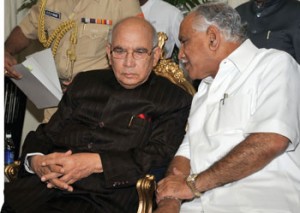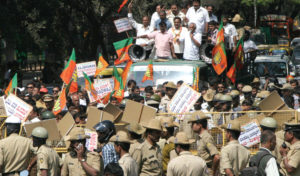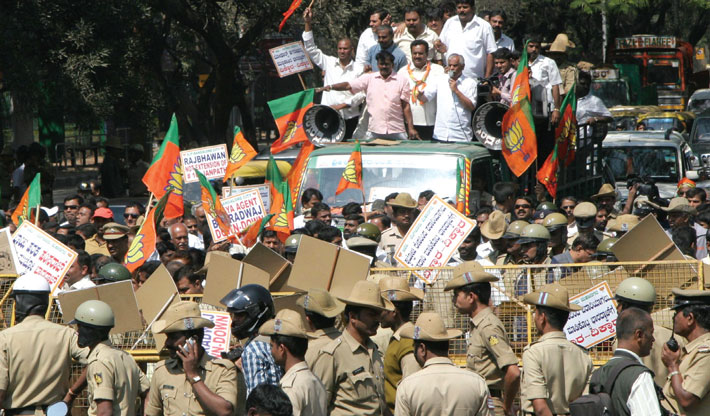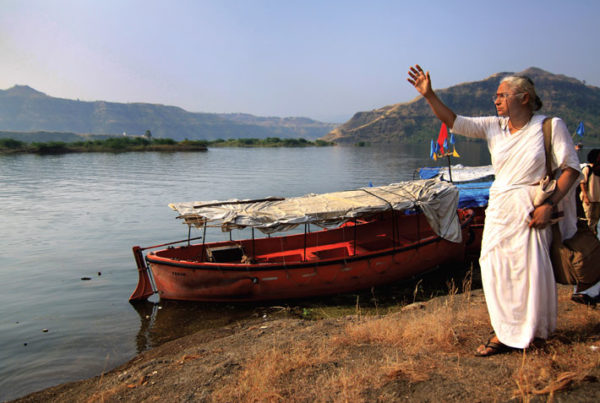
Although Chief Minister BS Yeddyurappa has displayed remarkable staying power in the BJP’s first southern stronghold, the odds are now stacked against him, writes Sanjana Chappalli. Photos by Dhananjay TK
THE ONE-VOTE wonder woman is not amused with the question. Rathnamma, a newly elected BJP taluk panchayat leader from Davangere district in central Karnataka, has not yet learnt the magical power of ‘no comments’ while talking to a journalist. In early January this year, she defeated her Congress opponent by a single vote (prompting residents to crown her the ‘one-vote wonder woman’) and wept tears of joy as she promised BJP party leaders she would be a loyal party worker.
A few weeks later, the Karnataka state BJP leaders called for a bandh protesting against Governor HR Bhardwaj’s decision to accord sanction to petitioners seeking to prosecute Karnataka Chief Minister BS Yeddyurappa for his involvement in several land scams across the state. During the bandh, BJP party workers went on the rampage demanding that the governor be held accountable for his partisan behaviour. Twenty-nine buses were burnt across the state on the day, including one in Rathnamma’s vicinity. The estimated losses to public property across the state ran into thousands of crores (litigation pending in the Karnataka High Court is seeking damages of Rs. 5,000 crore from the BJP for the bandh called that day).
Did she know why the bandh had been called? Did she think the governor was wrong? Unexpected. Inconvenient. The silence extends as she struggles to find an answer. In the end, after a feeble “I don’t understand the details”, she remembers several tasks that demand her urgent attention. There are no more answers.

IN THE past week, the public, and now longstanding, spat between the Karnataka governor and chief minister reached a feverish pitch. It has already claimed its first victim — clarity on the issue at hand. Political leaders across the spectrum — from the ruling BJP to the Opposition Congress and the Janata Dal (Secular) — have issued statements expressing their views about the constitutional validity of the governor’s decision.
To briefly recount the turn of events: on 28 December 2010, lawyers Sirajin Basha and KN Balaraj petitioned the governor seeking his sanction after they had been turned away by the Lokayukta Police.
Their petition was, however, not the usual two-page note but ran instead to more than 1,500 pages of documents that they had collected using the Right to Information Act. Prosecution of public servants requires previous sanction by the governor under section 197 of the Criminal Procedure Code (CRPC).
Nearly three weeks later, the chief minister, armed with a Cabinet decision, wrote to the governor seeking a dismissal of the petition pending before him. Two days later, on 21 January, the governor granted the lawyers sanction to criminally charge the chief minister and a host of others — and Governor Bhardwaj decided to write back to the chief minister. TEHELKA accessed a copy of this reply. Governor Bhardwaj is firm as he articulates his argument for rejecting the Cabinet’s decision that required him “in sum and substance to put a lid on the serious allegations of corruption against you (the chief minister)”.
He minces no words as he recounts the frequent media reports that detailed “allegations relating to land scams, corruption and manipulation of rules regarding acquisition and denotifying of public lands” thus creating a cloud on (the chief minister’s) personal integrity.”
The governor also went on cite a Supreme Court decision (MP Special Police Establishment vs State of MP (2004) 8 SCC 788) as he defended his right to an independent decision: “If, in cases where prima facie case is clearly made out, sanction to prosecute high functionaries is refused or withheld, democracy itself will be at stake. It would then lead to a situation where people in power may break the Law with impunity safe in the knowledge they will not be prosecuted as the requisite sanction will not be granted.”
 |
|
| Panic button BJP ministers come out of RajBhawan after meeting the governor on 22 January | Legal eagles Lawyers Sirajin Basha, KN Balaraj and others brief the media on their petition |
In the context of the above judgment, writes the governor, he is “entitled to and required to take an independent decision on the basis of the material available and therefore the Cabinet decision recommending to drop the consideration of the petition itself is unwarranted.” Sharp words and clear arguments that seemingly left no space for interpretation.
A day later, the two petitioners filed a series of criminal cases — 18 in all — against Yeddyurappa, his sons BY Raghavendra and BY Vijendra, the current Home Minister R Ashoka, former minister SN Krishnaiah Setty, among others under IPC sections 415, 416, 420, 465, 468, 463 and 471, relating to cheating and forgery. Cases were also filed under two sections of the Prevention of Corruption Act, sections 13/1 (d) and 13/1 (b),that related to the “criminal misconduct by a public servant”. Unnerved perhaps by the turn of events, the BJP took to the streets, protesting what it claimed was the overstepping of responsibilities constitutionally assigned to the governor.
Across the state, however, expressions of public sentiments through vandalism and protests by party workers aside, the BJP’s high-pitched claims of illegality are without any support. There is concurrence that the governor was well within his rights to grant sanction.
Says senior advocate and Constitutional expert Ravi Verma Kumar, “The governor had no choice in the matter since the evidence given to him was insurmountable. He was left with no other alternative. The petitioners had lost confidence in the administration and applied for sanction to prosecute the CM. Once they received the sanction, the process was set in motion.”
The timing and the manner of execution of the governor’s sanction, though, was unfortunate, says Lokayukta Santosh Hegde, since there were two other agencies (the Lokayukta and a government-instituted Justice Padmaraj Commission) enquiring into the allegations of corruptions in land deals.
Interestingly, TEHELKA found that in 2004, Justice Santosh Hegde as part of a Supreme Court Bench (along with four other judges) had defended the governor’s right to intervene in a similarly highpitched battle between the then Congressled Madhya Pradesh government and the BJP-appointed governor.
Higher Education Minister VS Acharya says that the BJP’s objections to the governor’s decision was hardly limited to a debate on constitutional rights of governors. What was at contention here was Bhardwaj’s allegiance to the Congress — the main Opposition party in Karnataka. Acharya told TEHELKA that the governor had behaved as “a Congress stooge” from the time of his appointment.
To be fair to the BJP, Bhardwaj is strongly aligned to the Congress. A Congress Rajya Sabha MP since 1982, Bhardwaj has served many terms as law minister. In his last stint as a law minister in the Congressled United Progressive Alliance (UPA) government, Bhardwaj chose to defreeze the bank accounts of Ottavio Quattrocchi, an accused in the Bofors scam, without the knowledge of the CBI — an action that was attributed back to the CBI by Prime Minister Manmohan Singh later.
Immediately after the formation of UPA2 government, where Bhardwaj was not granted a ministerial berth, he was asked to take charge as Karnataka’s governor replacing Rameshwar Thakur before he had completed his term. Almost from the day of appointment, the governor has been at loggerheads with the BJP government.
GOVERNOR BHARDWAJ and his oppositional stance (perceived or otherwise) to the BJP government in Karnataka is not unique in India at all. Since all gubernatorial appointments are decisions taken by the party in power at the Centre, the relationship between the governor and the ruling party in the state has always been a particularly contentious one.
In recognition of this, the Sarkaria Commission was set up to address the unequal power balance between the Centre-state and it submitted its final report with 247 specific recommendations in 1988. Several of these dealt with the discretionary powers of the governor as defined in Article 356 of the Constitution. The commission report has been largely ignored by both the Congress and the BJP — the two main political parties that have led governments at the Centre after the report was submitted.
“Since 2008, we have faced eight elections at various levels across the state. And we have done exceedingly well, each and every time,” says Acharya. “We have braved dirty political games and an offensive media campaign launched by a cynical opposition. People recognise that the BJP is serious about development.”Whatever the outcome of the recent flare-up between Governor Bhardwaj (and by extension the Congress) and the BJP, it is unlikely to trigger the collapse of the BJP government in Karnataka. The fact is that in Karnataka, the BJP, since it came to power in 2008, has won every election there is to be won. At every turn, senior BJP ministers including Yeddyurappa and Acharya (both veteran RSS pracharaks) talk of the people’s mandate being with the BJP. Seen from the BJP perspective, what has the party done right then?
That the BJP has won every election that has been held in the state is beyond dispute. In the recently concluded elections to the taluk and zilla panchayats in the state, the BJP emerged triumphant. Consider the overall figures. Immediately, after the declaration of results, out of a total of 30 zilla panchayat constituencies, the BJPwon 12 seats, with the Congress and the JD(S) winning four each. In the 176 taluk panchayat constituencies, the BJP won 68 seats, the Congress 31 and the JD(S) 29.
A step beyond the overall numbers however and a slightly different picture emerges. In several key constituencies, the BJP just managed to scrape through. In Shimoga, the chief minister’s home constituency and a supposed BJP stronghold, the BJP won 16 seats. The Congress won 13 seats. In Uttara Kannada district, part of the communally volatile coastal region, it was a clean sweep for the Congress as it bagged 22 seats out of 31. The BJP was left far behind at six seats. As always, the results of the election in the Reddy republic of Bellary was instructional — the BJP won 18 seats (one short of majority) while the Congress won 17 seats.
If there was a lesson that the BJP should have learned through its barely-there election results, there was another for the Congress and the JD(S) — that the BJP will do all it can to achieve electoral majority in Karnataka. Mirroring its efforts in the aftermath of the 2008 Assembly election, the BJP unleashed its now infamous Operation Lotus. Shamelessly luring winning candidates from the Opposition parties into its fold with inducements of money and power, the BJP widened its winning majority. In Bellary, tourism minister Janardhan Reddy is said to have personally walked into the house of the lone JD(S) winner, Nagratnamma, to ‘invite’ her into the BJP fold. Two days later, the BJP had achieved the majority required to retain Bellary.
WHATEVER THE OUTCOME OF THE FLARE-UP, IT IS UNLIKELY TO TRIGGER THE COLLAPSE OF THE GOVERNMENT
Ask JD(S) president HD Kumaraswamy about the BJP luring away his candidate and the tone understandably gets acerbic. “The BJP government has managed to retain its hold over the state by winning elections through unfair means. The people have not voted for them openly — almost always, they have been co-opted using coercion, money or gross misuse of official power. And this has been the case from the local cooperations upto the state Assembly level, farmers to legislators have fallen prey to the BJP,” says Kumaraswamy. He should know, having watched the BJP mercilessly eat into the numbers his party put up immediately after the Assembly election. But the BJP strategy to lure people into the fold has not been restricted to legislators or elected representatives alone.
IN 2008, for instance, soon after the Assembly election, the BJP targeted the Karnataka Milk Federation (KMF), a powerful statewide network of dairy farmers. Clearly announcing their plan to wrest the federation away from the JD(S) — the KMF president in 2008 was Kumaraswamy’s brother HD Revanna — the BJP floated a parallel association of dairy farmers that induced farmers away from the KMF even as others within the federation levelled corruption charges against the office bearers. In a matter of months, the BJP had taken over KMF entirely and B Somashekhara Reddy (from the Reddy brothers’ republic) was installed president.
If the example of a dairy farmers’ federation seems far too trivial to explain the BJP’s entrenchment, consider the similar strategies they unleashed to garner support within the tailors’ and teachers’ associations and the explanation seems more palatable. Place this against a lacklustre JD(S) and a perpetually divided Congress and the importance of the BJP’s efforts to entrench itself in key constituencies magnifies tenfold.
“Apart from our developmental work, our mobilisation on the ground has been intense,” says Acharya. “BJP workers are the reason behind our victory. As for organisations like the KMF, tailors association or the various seers — we have taken care of these people. The Congress and JD(S) have none of this to boast about.”
There can be no disputing that. Both the Congress and the JD(S) have struggled to counter the BJP’s mobilisation strategies. “Nothing seems to work,” says a senior Congress leader in Karnataka, “And with the leadership in constant crisis, this is not surprising at all. Do we assign leadership on the basis of the state’s caste composition? Or on the basis of the leaders’ proximity to the Central High Command in New Delhi? Or on the basis of their seniority in the state? There is no consensus at all.” Having been forced to resign from a senior position himself because of the infighting, it is easy to see why he would not go on record with TEHELKA.
At another level, it is obvious that the lack of cohesion within the Congress and the shrinking support base of the JD(S) also limits their strategies.
The fight is restricted to the media where exposé after exposé reveals layers of corruption in the government — in the hope that it will raise the anti-incumbency factor in the next election. It is restricted to a governor who will leave no stone unturned within his Constitutional ambit to tighten the screws on the BJP government.
IT ISN’T A CRISIS OF NUMBERS BUT A FAR MORE WORRYING MORAL CRISIS. NITIN GADKARI HAS ADMITTED AS MUCH
THAT THE Yeddyurappa-led BJP government in Karnataka is in crisis is beyond doubt. It isn’t a crisis of numbers — it enjoys the support of the majority of legislators in the Assembly, for now — but a moral crisis. And the acknowledgement of this moral crisis comes straight from the BJP national president Nitin Gadkari who famously ascribed the charge of moral corruption to his party colleague, the Karnataka chief minister.
“The BJP is wreaking havoc in the state,” says Kumaraswamy. “Yeddyurappa’s misdeeds are plainly visible. And yet the BJP will not change its chief minister. We did not make any demands to dismiss the government, did we?”
There are ready answers from the BJP. “The Congress and the JD(S) are not prepared to face another election because they will lose miserably. That is why they need the support of a governor like Bhardwaj to attack the BJP,” says Acharya.
The case against Yeddyurappa
Denotification, changing of zonal regulations and even amalgamation of roads — all this brought enormous profit for the Chief Minister and his family while the exchequer lost out
- 16 ACRES under Survey No. 56 at KR Puram, Bengaluru, were denotified in 2008 and transferred to M/s Davalagiri Property Developers Pvt Ltd. The land worth Rs. 7.4 crore was transferred to this company in which the CM’s sons and son-in-law are 75 percent share holders.
- A ROAD measuring 47,972 sq ft in Vyalikaval, HBCS Nagawara was illegally amalgamated and the same was purchased by M/s Davalagiri Property Developers. The company gained Rs. 16.26 crore due to this.
- AN ACRE and two guntas (1 acre = 40 guntas) under survey No. 55/2 at KR Puram was denotified. The gain in this was Rs. 19.6 crore.
- TWO ACRES and five guntas were denotified at the Arkare village. Out of this, 1.75 acres were sold to a close associate of the chief minister, who gained Rs. 25.39 crore due to this.
- NINE GUNTAS in Survey No. 10/1 and 14 guntas in Survey No. 10/11F of land in Lottegollahalli, Bengaluru, was denotified. Fourteen guntas in Survey No. 10/11F was denotified in favour of state Home Minister R Ashoka.
- CONVERSION OF agricultural lands in Anekal taluk to non-agricultural purpose by modifying zoning regulations was beneficial to Bhagath Homes and Davalagiri Property Developers, both promoted by CM’s family members. The firms benefited to the tune of Rs. 3 and Rs. 2.5 crore due to this.
- TWO ACRES and five guntas in Survey No. 149 of Agara village were denotified in January. Plots of 16,000 sq ft and 5,000 sq ft were sold to M/s Elyon Developers Pvt Ltd represented by its director SS Ugendar for Rs. 1.76 crore and Rs. 44 lakh respectively. The Bengaluru Development Authority incurred a loss of Rs. 74.05 crore due to this.
- 100 ACRES at Machenahalli-Honnavile Industrial area, Shimoga district, was allotted to E Rama Murthy Power Pvt Ltd promoted by Praveen Chandra. He also granted a mining lease for iron ore and manganese ore in 330 acres in Ramajjanahalli Kaval and Mallapura villages of Hosadurga taluk in favour of Praveen Chandra.
- NINE ACRES at Rachenahalli was denotified. The owners of these lands sold 1 acre 23.2 guntas for Rs. 2.55 crore to M/s Health Zone Advisors (India) Pvt Ltd when the market value was Rs. 34.41 crore.
- 33 GUNTAS in Survey No. 21/3 of Kempapura village, one acre and 36 guntas in Survey No. 6/2A, 23 guntas in Survey No. 6/2C and 23 guntas in Survey No. 6/2B in Hebbala Ammanikere was denotified to benefit Prakash Shetty of M/s Trishul Developers.
- 11 ACRES and 25 guntas in Survey No. 15/1 and 15/2 of Srirampura village denotified to benefit Besto Infrastructure, Bengaluru, whose promoter is a partner with the chief minister’s family in Davalagiri Property Developers. The land was denotified in favour of Dr BR Shetty, who in turn sold two acres and 20 guntas to Besto Infrastructure for Rs. 3.75 crore when the market price was Rs. 54.45 crore.
- TEN ACRES in Survey No. 121 of Uttarahalli village was denotified on the request of BJP MLA Dr Hemachandra Sagar.
- FIVE ACRES and 13 guntas of land in Survey No. 78 of Nagarbhavi village denotified in violation of Supreme Court and High Court orders, causing loss of Rs. 115 crore to the BDA.
- ILLEGAL ALLOTMENT of a site in RMV II Stage, Bengaluru, to son BY Raghavendra. This property was returned when allegations of corruption started to pour in.
- THERE IS an allegation that the chief minister helped Adarsh Developers and took favours in return to the tune of Rs. 5 crore.
—
This article was originally published in Tehelka, a leading independent news magazine in India, known for its investigative journalism.



